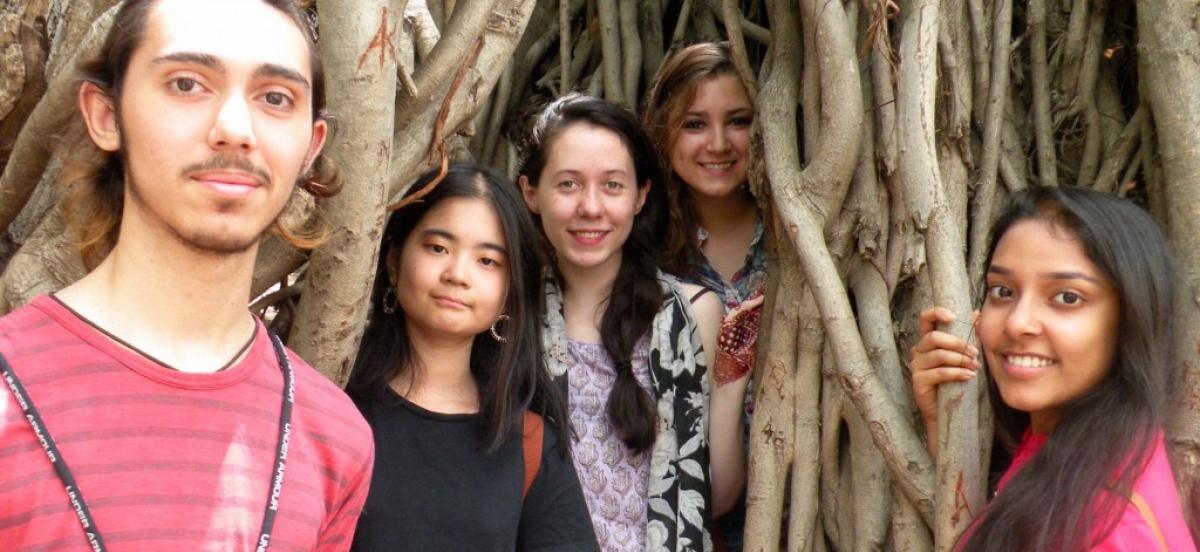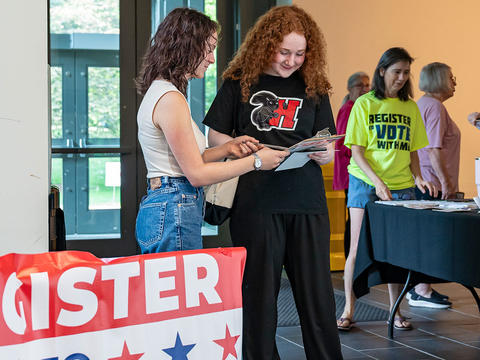Summer Centered: An Ethnographic Mission in Urban India

(From left) Evan Klasky '19, Alice Lin '19, Katie Rodgers '18, Alex Belfi '18, and Soumya Venkateswaran BMC '18 in India.
Details
This summer the Center for Peace and Global Citizenship has sent five Bi-Co students to work with local NGOs and convey their ethnographic insights using creative multimedia tools.
Just weeks after wrapping up a busy school year, five Bi-Co students—Katie Rodgers ‘18, Alex Belfi ‘18, Evan Klasky ‘19, Alice Lin ‘19, and Soumya Venkateswaran BMC ‘18—brought together by their common interests in anthropology, contemporary art practices, and human-rights work, were traveling roughly 8000 miles to undertake a multimedia ethnography project. They traveled to Pune, a rapidly developing city in central-west India, as part of a new CPGC-sponsored summer internship under the mentorship of Visiting Professor of Anthropology Ethiraj Gabriel Dattatreyan, who designed and organized their trip.
“My larger goal for something like this is to start to develop immersion-based opportunity for students, rather than just having their learning take place in the classroom setting,” says Dattatreyan. “Locally and internationally, students should have opportunities to learn what it means to engage in the social issues of our day in a hands-on way as much as possible.”
Dattatreyan wanted his students to understand and describe the lives of the people of Pune, and to that end, this internship immersed them in life there and offered them a chance to create films, sculptures, installations, and digital projects that captured what they observed.
After a week-long pre-orientation at Haverford, the students relocated to Pune’s TIFA Working Studios. This artist residency, established in a former 19th century Art Deco style hotel, served as a home base for their seven-week stay. During that time they interned for local non-governmental organizations (NGOs) while simultaneously collaborating with TIFA’s mentor artists and using a full range of media to conceptualize their final projects. These creative works, which were displayed in the gallery spaces of TIFA at the end of their stay, were meant to represent their experiences as newcomers to Pune’s social and cultural environment. (They also elaborated on their experiences on their blog.)
A first-time visitor to India, Katie Rodgers interned at EcoAd, a nonprofit working towards an eco-friendly future for India by replacing plastic bags with paper bags. Unsure about whether or not she would be able to spend a semester studying abroad, the English major was looking for a “summer abroad” opportunity and was surprised to find one that matched her needs.
“After taking two documentary [filmmaking] courses with [Hurford Center Visual Media Scholar] Vicky Funari this year, I wanted to pursue video production and test out an internship to see if it’s something I want to continue pursuing,” Rodgers says.
The multidisciplinary nature of the internship appealed to Evan Klasky, who interned at iTeach, a nonprofit that works to decrease the staggering dropout rate among Pune’s tenth-graders by making education affordable to low-income families. However, he believes that the most valuable learning opportunity of the internship was the experience it offered him to adjust to different cultures and worldviews. He says that he is coming back to campus with newfound insight about how his perspective as an American college student colors his perception of things.
“As a prospective political science major," he says, "I feel that that is extremely important to my work at Haverford.”
Alice Lin also worked with iTeach. A prospective anthropology major, she became interested in the program after taking an anthropology course on urban South Asia. Unlike her peers, Soumya Venkateswaran, a Bryn Mawr student and anthropology major with a fine arts minor, was no newcomer to South Asia. Her family comes from southern India and she has traveled to India many times, yet she felt her internship offered her the chance to have an unfamiliar experience in a familiar location, noting that her unsheltered environment and daily interactions differed enormously from what she would usually encounter on her travels. Venkateswaran worked with Care India Medical Society, a center providing free cancer treatment and support, along with Alex Belfi, a biology major and anthropology minor at Haverford.
Overcoming the tension between working to fulfill the NGOs’ missions and using these experiences for creative expression was one of the many intellectually demanding features of the program, as Dattatreyan noticed in his weekly check-ins with the students. However, this tension will always exist in anthropology, he says.
“If that was achieved—if they could be aware of and engaged in that tension—then a huge part of the goal of this project would be met, which is really getting them to think about what ethnography is,” he says.
Although Dattatreyan is starting a new position at Goldsmiths, University of London this fall, he is planning to continue and expand the program. In the coming years, the internship may host not only Bi-Co students, but also Goldsmiths undergraduates and graduates, scholars, and artists, all traveling together to the vibrant urban center to participate in a dialogue about social issues and their artistic representation.
-Katya Konradova '19



